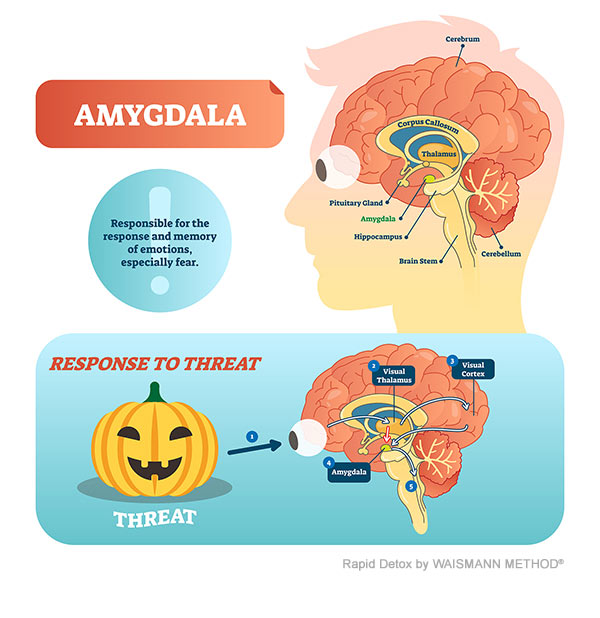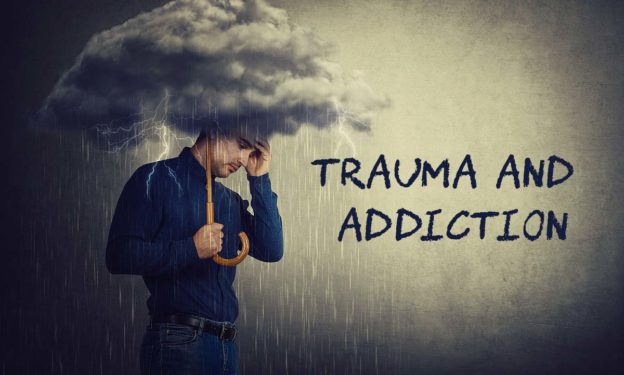Trauma and addiction often go hand in hand, yet many people remain unaware of the link between them. Trauma is your emotional reaction to a distressing life situation. Experiencing trauma puts you at higher risk for addiction to opioids, alcohol, and other substances. Learn how trauma and addiction fuel each other, as well as what you can do to break free of your traumatic past. Individualized treatment for addiction and trauma is the first step toward healing.
The Connection between Trauma and Addiction
Trauma is an emotional response to something that happens in your life. There are many types of events that trigger trauma. For example, some of the most common are physical abuse, sexual abuse, parental loss, car accidents, military combat experiences, natural disasters, or the death of a loved one. While most of us will experience some traumatic events during our lives, emotional responses to trauma vary.
Untreated trauma is a major cause of addiction. When people have untreated trauma, they get stuck in a damaging pattern of thoughts and behavior. Therefore, they might feel chronically stressed, cry a lot, have scary thoughts about the trauma, feel hopeless, and withdraw from friends and family. Drinking alcohol or using drugs are easy ways to numb this emotional pain and temporarily feel better. Unfortunately, drug use is just a bandage that does not treat the underlying trauma. Over time, people lose their ability to control their drinking or drug use. As a result, this leads to addiction.
Effects of Trauma on the Brain

For over 26 years, people from all over the world have chosen Waismann Method as their opioid detox provider.
We know the challenges you face and the importance of creating a unique and personal experience for you right from the start.Call for Detox Options 1-800-423-2482
After the traumatic event ends, the amygdala is supposed to go back to its normal activity level. For some people, however, it stays active. This causes your brain to send recurrent fear signals to your body. For example, imagine you got mugged as you walked from work to your parking lot. After the mugging, you might feel scared, shaky, angry, or anxious. The next time you walk through the parking lot, some of those feelings likely come back. But two months later, after you’ve returned to the parking lot dozens of times, you probably have a much less fearful response. For people with a prolonged trauma reaction, that fear response never really goes away. They may stay hypervigilant, always looking over their shoulders or feeling “keyed up” when they come to the parking lot. That’s a sign that your brain has not adequately dealt with trauma.
Amygdala Function
There’s a strong link between the amygdala fear system and the brain’s pleasure and reward system. After trauma, the amygdala becomes hyperactive and causes chronic stress. This primes the reward system to respond strongly to anything that makes you feel good. Positive behaviors like exercise, psychotherapy, and meditation can trigger this reward system. Unfortunately, so can unhealthy behaviors like using drugs or drinking alcohol. Because the reward system is so tightly linked to the stress system, unresolved trauma can make a person more vulnerable to addiction.
Untreated Trauma Often Leads to Addiction
Surviving a traumatic event can lead to posttraumatic stress disorder (PTSD). PTSD is a clinical condition that includes nightmares, flashbacks, and hypervigilance that continue for several months after a trauma. Not everyone who experiences trauma will develop PTSD. But even those without PTSD may have lingering effects of trauma that last years.
Without treatment, trauma is like a wound that never fully heals. Sadly, many people are stuck in life situations that lead to multiple traumas. For example, domestic violence can last years and involve countless traumatic events. Experiencing multiple traumas causes your brain’s fear center to change, making you more likely to be chronically stressed, depressed, and unable to cope with everyday life stressors. This significantly increases the likelihood of using drugs or alcohol to cope with pain. Over time, drug and alcohol use becomes a problem of its own. Not only does it not treat the trauma, but it creates its own issues with your physical health, social relationships, and mood.
Mental health is possibly one of the most crucial factors for determining a person’s overall health, but it’s definitely the most forgotten. _ C. Waismann
Finding Effective Treatment for Trauma and Addiction
The good news is that trauma and addiction are treatable. The best treatments for trauma and addiction recognize that these are interrelated issues. When treating addiction and alcoholism caused by trauma, the goal is to help an addicted person detox from substances. This puts them in a good mental state to get individualized treatment for trauma.
Waismann Method® Opioid Treatment Specialists offer patients medical detoxification options for reversing opioid dependence. Patients undergo opioid detoxification in a private accredited hospital where they receive comprehensive medical support and withdrawal management. The medical team individualizes detox protocols based on each patient’s unique health needs. This includes medical evaluation, pre-medication, detoxification, and recovery care.
Domus Retreat
After undergoing detox, a person is ready to begin the journey toward recovery from trauma and addiction. Without drugs or alcohol clouding their vision, patients can focus on healing. Our exclusive Domus Retreat provides a serene setting for patients to receive trauma-informed care, including individual psychotherapy. This is where patients begin finding acceptable forms for unpacking their trauma and healing from untreated wounds. By focusing on the root cause of addiction, patients can learn new skills to cope with their trauma more healthily. Therefore, this approach is one of the most effective treatments for trauma and addiction.
Conclusion
For many people struggling with substance abuse due to untreated anxiety and trauma, quitting can be challenging. However, in addition to the difficulty of often changing longstanding, compulsive drug and alcohol use patterns, detoxification may also give rise to painful withdrawal symptoms and potential withdrawal complications.
Thankfully, detoxification can be safe and less uncomfortable when patients receive the supportive care, close monitoring, and medical intervention they need. Effective programs help individuals overcome fear, get through the detoxification process, and guide them to receive adequate emotional support. Also, this combination of therapeutic services allows the individual the best opportunity to complete recovery and avoid relapse in the future.
Sources
- Mayo Clinic: Post-traumatic Stress Disorder (PTSD)
- Journal of Social Work Practice in the Addictions: Examining the Relationship Between Trauma and Addiction
- NCBI: Traumatic Stress: Effects on the Brain
Written by Aurora Harklute
Aurora is a neuropsychologist and freelance writer with more than ten years of experience with a bachelor’s degree in human physiology, a master’s degree in cognitive psychology, and a Ph.D. in clinical psychology. Aurora writes for a variety of industries within the substance abuse and medical fields. She also specializes in the impact of substance use on mood and cognition.
Reviewed by Clare Waismann, Registered Addiction Specialist (RAS), Substance Use Disorder Certified Counselor (SUDCC), founder of Waismann Method® Advanced Treatment for Opiate Dependence and Domus Retreat®. Clare Waismann is an authority and expert on opioid dependence, opioid use disorder, substance dependence, detoxification treatments, detox recovery, and other topics covered on RapidDetox.com.






